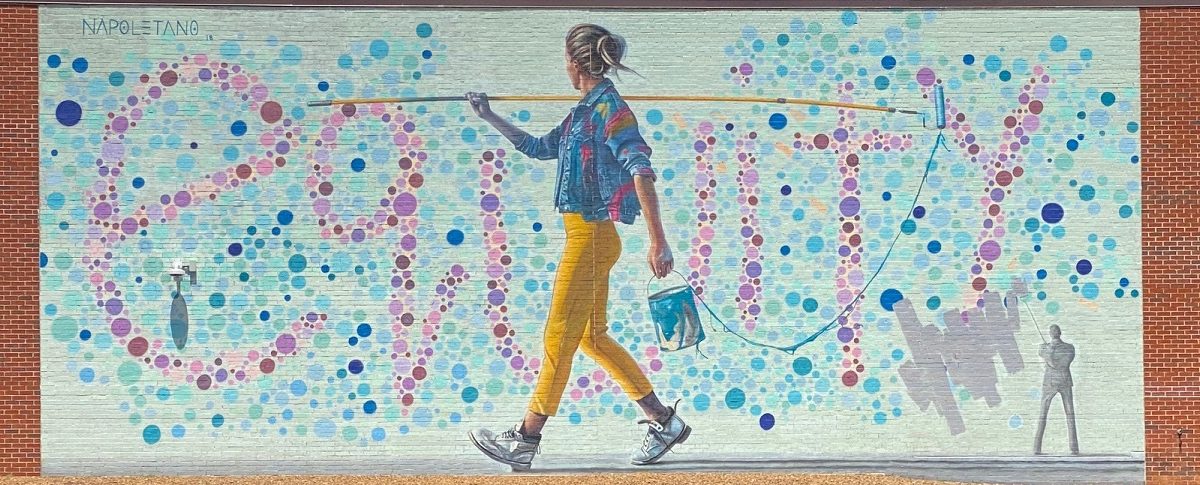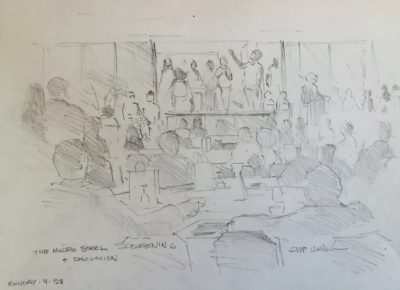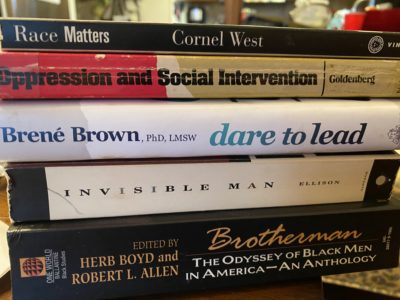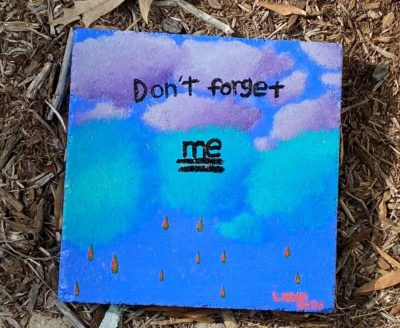
|
|
In March 2021, Gerry Hancock, our co-founder and chair of the board since EducationNC’s inception, resigned. We will be forever thankful for his vision and leadership.
As you would expect, we took a look at our bylaws to see what they said should happen next.
But one of the things we have learned in our diversity, equity, and inclusion (DEI) work is that urgency often perpetuates the patterns we seek to disrupt.
“What would it look like to see this as an opportunity to align our board governance with our work on diversity, equity, and inclusion?” asked board member Tracey Greene-Washington. “What would it look like for a nonprofit board to not be defined by the practices of dominant culture?”
Just days later, Andrew Holton, a board member and lawyer by training, proposed a governance structure based on distributive leadership.
On June 4, 2021, EdNC’s board of directors voted unanimously to amend our bylaws. The motion was made by Tom Bradshaw, an older white board member, and it was seconded by Yona Wade, a younger American Indian board member.
At EdNC, we approach our work on DEI intentionally through four dimensions: intrapersonal (this is the “I” work), organizational (this is the “we” work), community presence (this is “our walk”), and systems change (this is “the way” forward). Here are the previous updates on our work:


This update focuses our intrapersonal and organizational development.
Intrapersonal development
The “I” work is the hard work we all have to do personally and professionally. This dimension is about our people, the EdNC team.
In May 2021, EdNC invested in four full days of racial equity professional development led by Dr. Kebbler Williams with the Hunt Institute. We wanted to think about DEI through the lens of a school and a district, and this is the training the institute provides educators.
“I deeply appreciated this experience,” said EdNC’s Dean Drescher. “I got to stretch my own thinking and align on a shared vocabulary with my colleagues. I also got to know myself a bit better. Most importantly, I walked away with greater perspective and tangible actions.”
Belonging continues to surface as the priority for our team. All of the DEI work is for naught if the team doesn’t end up feeling a true, authentic sense of belonging.
We don’t offer benefits, but we invest in our team so they can buy the benefits they need and want. In 2021-22, we will pay everyone above the median salary in the United States for a journalist, including those just graduating from college.
Organizational development
This is the “we work.” This dimension is about our organization and our purpose.
Board governance
Here are the changes we made in our board structure to distribute leadership and power.
Our executive committee became our board, and our board became our strategic council. Under our former bylaws, the executive committee already had the power to make most decisions for the board. This is more transparent when it comes to how we actually operate.
The new board with nine members will share power. The positions of chair and secretary/treasurer will rotate from one board meeting to the next, guaranteeing each person on the board the opportunity to serve as chair at some point in their tenure. Holton is serving as chair currently.
The distribution of power is balanced by a distribution of accountability. The board will meet monthly with updates on finances and personnel. The board will have a leadership committee made up of three members of the board, which will make nominations to the board and strategic council. A smaller board with distributed power serves to reinforce our commitment to the independence of our journalism. Influence will be limited along with power. Each board member will serve one three-year term.
For now, Ferrel Guillory will stay in his role as vice chair and editorial advisor. Guillory writes for EdNC, meets with the CEO as needed, and conducts the CEO’s annual 360.
Our former board will operate as our strategic council going forward. Each member of the strategic council may serve two three-year terms. Terms are staggered to provide both continuity and new voices.
The board and strategic council will meet together three times a year: in January, June, and then in September for a retreat, which always includes a visit to a school or community college. Our meeting cadence is not changing; the meetings will just be less about business operations and more about our work. The purpose of the strategic council will be to inform the work of EdNC by giving the board and CEO feedback and counsel.
As a matter of practice, the strategic council will have affinity groups, giving the board and council the opportunity to meet with the EdNC team in small groups to build relationships. Affinity groups will share knowledge relevant to EdNC’s journalism and our engagement in education policy and issues.
In our practice of leadership, we believe in just starting. This is a starting point of a journey to find a better way to govern organizations.
We don’t have answers to all of our questions so we plan in one year to revisit the following:
- Reflect on and iterate the distributive leadership model.
- Consider how often the chair rotates and how the baton from one chair to another is passed.
- Consider the vice chair’s ongoing role.
- Revisit the CEO/president/editor-in-chief roles given organizational growth to include a director of operations.
- Revisit issues around the consolidation of power, including whether the CEO/president/editor-in-chief have a vote.
- Review leadership succession relative to changes in governance.
From our attorney, Amanda Martin: “What you’re wanting to do sounds terrific, and on first review, I see no legal impediment.”
From our auditor, Dave Corn: “I applaud you for your willingness to try distributive leadership and wish you good luck as you implement and start with the board responsibility changes. I do not have any specific concerns from an audit or tax standpoint. As long as we can continue to present our work to you and a proper subset or individual with the Board to review/approve, then we have no issues.”
This will give many more people the opportunity to play leadership roles in our organization.
“The new governance structure will allow EdNC to continue in a way that is purposeful and strategic,” said strategic council member Steve Lassiter. “My support for the structure will allow the board and council to focus more on the work and to allow more voices to be heard. Working in smaller groups and teams will make the organization stronger as we continue to focus on education and policy issues.”
In the interest of transparency — and because we hope others will move to distributive governance and we can learn from each other — here are our amended bylaws.
Building diversity
Our team remains too white.
In our work with the NC Media Equity Project, we produced this video to reach out to students to inform them about our work, the work of other outlets, and the different jobs available in a media organization.
“We need your voice in North Carolina,” says Rochelle Ford, Dean of Elon’s School of Communications.
In March, EdNC’s multimedia reporter Alli Lindenberg offered to build a fellowship for EdNC to help us build a more diverse pipeline. Of 62 applicants, 51.6% were nonwhite, including 33.9% Black, and 24.2% were LGBTQ. We are paying two fellows $5,000 for eight weeks of full-time work this summer. It was important to us to pay at least $15/hour.
“The demographics of our applicants are the result of a diversifying workforce and strategic recruitment,” said Lindenberg. “We have always reached out to our friends at UNC System schools, but this year we focused on expanding our strategy to include HBCUs and community colleges. We reached out to two HBCUs and two community colleges in addition to four UNC System schools.”
Listening and learning from others
This spring, prior to our change in governance, we brought in the Maynard Institute to walk our executive committee — and invited guests — through the six fault lines of journalism, including race, gender, sexual orientation, generation, geography, and class.
Resolve Philly participated in the conversations with our then-executive committee. Resolve has been in partnership with us through their use of the Reach NC Voices platform for their Equally Informed Philly project. Resolve has mentored us on the importance of partnerships, equitable collaborations, and listening to your community.
With the support of the John M. Belk Endowment, CREED is leading an initiative called Listening to the NC10. We are partnering with CREED, myFutureNC, and The Hunt Institute in this effort, which seeks to have conversations with all 10 HBCUs in North Carolina, including the leadership of each college and university, and ultimately lift up the legacies to increase the statewide prominence of the NC10.
An ongoing equity audit
We have retained Tara Kenchen, an attorney and former teacher who is the principal consultant for UF Strategies, to lead us in the coming year as we develop an ongoing way for EdNC and other media organizations to audit their work. Equity audits tend to be snapshots in time. They are retrospective. If they blame and shame, too often the work stalls out. And leadership transitions create a real risk point for bringing the journey to an end.
We want to build a different type of equity audit. One that is ongoing. One that has buy-in from the team, the board, the funders, and the audience. One that is embedded in the day to day of our work.
Kenchen says, “Even the term audit has a negative connotation to many. We want to design and implement a long-term, forward-looking commitment that becomes part and parcel of who EdNC is as an organization and how they show up in the world.”
Kenchen is in the process of becoming certified through the Coach Diversity Institute to build a process for us and lead us through this work. Her certification includes 90 hours of in-person training, six virtual learning labs, 12 peer coaching hours, and 10 mentor coaching hours.
Our way forward
Here are our next steps in the journey:
Intrapersonal: Diversity, equity, and inclusion training through a media lens.
Organizational: Developing a playbook for an ongoing equity audit for EdNC and other media organizations.
Community: Surveys, listening sessions, and visits to all 100 counties to build a more diverse audience and deepen our reach.
Systems: NC Media Equity Project.
My thanks to all of you who create space for our process to be messy and take the time to give us feedback on our approach to DEI+belonging. Stay tuned.
Recommended reading




